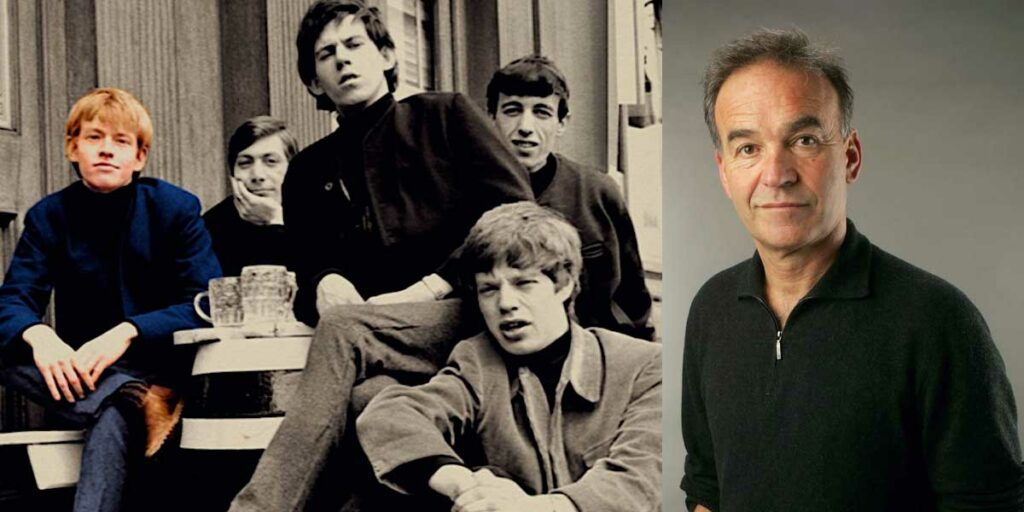We interview director Nick Broomfield about his documentary, The Stones and Brian Jones, a reverent look at the life of The Rolling Stones’ founding member.
Veteran director Nick Broomfield returns with The Stones and Brian Jones, a powerful and respectful documentary on the life, career, and tragic death of The Rolling Stones’ most intriguing member.
With never-before-seen concert and interview footage of the Stones, and in-depth footage with the Stones’ bassist, Jones’ girlfriend, and Jones’ father, The Stones and Brian Jones tells the story of Brian Jones. He had a massive impact on one of the world’s greatest rock bands in their early years. From his time as the ringleader of the Stones to his descent into addiction amid Mick Jagger’s rise to stardom, the documentary is intimate and fascinating.
We spoke with Nick Broomfield to discuss The Stones and Brian Jones, the concert climate of the 1960s, and the conspiracy theories surrounding Brian Jones’ death. Read the interview below!
Nick Broomfield on the Rolling Stones’ fascinating beginnings
Thank you for speaking with us today on The Stones and Brian Jones. It’s great to see the conversation about Brian Jones revived for longtime fans or people who might not be aware of his impact on the band. What was it like to work on a project like this, and specifically about Brian Jones?
Nick Broomfield: It was fascinating. I think looking at the beginnings of things is often the most fascinating, because it’s when everyone is trying to find their way. They’re trying to find their style; they’re trying to do something completely new. I think particularly with the Stones, they were not only the first British group who were doing R&B, but they were also the first really meteoric band—other than The Beatles—who were forging a completely new way.
I mean, it was before there were any managers. Concerts, as shown in the film, were completely chaotic, because there was no security. It was complete anarchy, people ripping up the chairs and throwing them around, it was almost an excuse for a riot. And I think all that sort of pent up energy that happened in the early ‘60s, as a kind of protest against the oppression of the pre-war generation really came out. It was such an amazing phenomenon then, and it was incredible to find that footage. I find it sort of unbelievable, because now concerts are all rather well organized with security and other things. But back then, there were complete riots. Even airports got trashed.
The irony, I guess, was that it was the Stones, and their relationships with people like Howlin’ Wolf and Muddy Waters introduced them to an American audience. They were much more popular in England, then Alexis Korner brought them over to play in the United States. So they became The Stones’ heroes. So when the Stones became really popular, they got Howlin’ Wolf and others onto mainstream American television, and introduced them to an American White audience. It was just an amazing time, really.

The documentary shows that Brian Jones did much of the work himself, such as public advertising and recruiting band members. That feels very different from what we think of the Stones now: as one of the world’s most successful rock bands.
N.B.: Yes, he was the guy who put the ads in the newspaper. I find it amazing when you hear from Bill Wyman, the former Stones bassist, that he was an engineer. Then, of course, Brian put Keith Richards and Charlie Watts into the mix. So the Rolling Stones was Brian’s creation, in a sense. He was doing all the bookings and I think he said in one of the interviews that they were being paid 10 pounds for a gig. So it’s amazing that now they get millions for one gig.
Dismantling conspiracy theories about Brian Jones
There are conspiracy theories surrounding Brian Jones’ death, but the documentary does not address them. Is there a specific reason you made this decision?
Nick Broomfield: I looked into it, and I saw the books and a couple of the films that have been done. But it seemed to me incredibly wooly, poorly thought through, and inconsistent. I obviously talked to a lot of people about it, including Bill Wyman. Bill’s girlfriend at the time, Ingrid, was best friends with Anna Wohlin, the woman who pulled Brian out of the pool. Anna went and stayed with Bill and Ingrid immediately afterwards to get away from the press. She told them everything, that she was traumatized, and just in a terrible state. They spent three or four days talking about what had happened. Bill was very clear that Brian had taken Mandrax before going to the pool, which was what Brian was addicted to at the time. Bill said that there was no question about that.
Then, 10 years later, Anna Wohlin published a book saying that he’d been murdered. And Bill’s explanation for that was that, frankly, she needed money, so she came up with this whole theory. And I think the trouble is, when somebody who’s young and famous dies under somewhat mysterious circumstances, there’s always a conspiracy theory, but I didn’t really feel it had any validity. I didn’t want to open it all up in order to discount it, so I just didn’t address it in detail.
Nick Broomfield on pacing with directing, and what’s next
What do you have planned for the future?
Nick Broomfield: Well, I really wanted to get this film out. It took such a long time to make, especially retrieving all the original archive that hadn’t been seen before. I’m one of these people who can’t walk and chew at the same time, so I always finish a film before I start the next one. I don’t really know quite what I’m going to do next. I think I’ll probably take a couple of months off to think about what I really want to do. Because these films take us sort of a year or two to do, I take the time to consider what I really want to make.
This interview has been edited for length and clarity.
The Stones and Brian Jones will be released in US theaters for a Special One Night Only event on November 7, 2023, and will be available nationwide on November 17. In the UK, the film is now available to watch on digital and on demand.

